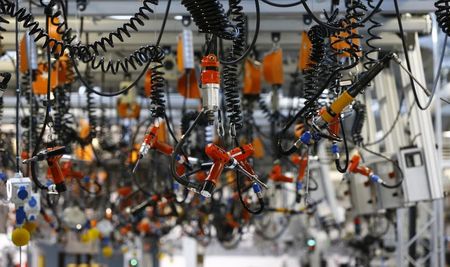By Michelle Martin
BERLIN (Reuters) - German industrial orders tumbled in August by their largest amount since the height of the global financial crisis in 2009, casting a shadow over Europe's largest economy at a time when Berlin faces pressure to loosen the fiscal reins and spend more.
Data from the German economy ministry showed contracts plunged 5.7 percent on the month, far weaker than a Reuters consensus forecast for a 2.5 percent drop.
Bookings from countries outside the euro zone plummeted 9.9 percent, while those from within the single currency bloc fell by 5.7 percent. Domestic orders also dipped by 2.0 percent.
"That clearly bodes ill for the fourth quarter," said Carsten Brzeski, senior economist at ING. "It's not only a Putin fear factor - Germany is also suffering from the weakness of its euro zone peers."
The German economy had a strong start to the year but shrank by 0.2 percent in the second quarter and some economists have warned it could contract again in the third quarter, pushing it into a technical recession.
The bad economic news comes at a time when Germany faces pressure from partners and the European Central Bank to spend more to help boost stalling European growth. German Chancellor Angela Merkel's government has said it has little wiggle room for stimulus given its promise to balance the federal budget next year.
A media report at the weekend said the International Monetary Fund (IMF) will this week cut its estimates for German economic growth in 2014 and 2015 to around 1.5 percent for each year due to the crises in Ukraine and the Middle East.
The Economy Ministry said manufacturers took on fewer bulk orders than average in August and added that orders in July - which were revised up to a rise of 4.9 percent from a previously reported gain of 4.6 percent - had been boosted by the late summer holidays.
But it said that even taking such volatility into consideration, order levels were weak overall due to the subdued euro zone economy and uncertainty caused by crises abroad.
Factories producing capital goods had a particularly rough month, with 8.5 percent fewer orders flowing in than in July, while intermediate goods manufacturers also suffered.
Consumer goods orders, which were up by 3.7 percent thanks to a surge foreign contracts, were the only bright spot.
The weak data comes after a survey last week showed Germany's manufacturing activity shrinking for the first time in 15 months in September as new orders dried up.

Orders lie 0.3 percent below second-quarter levels, the Economy Ministry said.
(Reporting by Michelle Martin; Editing by Noah Barkin)
